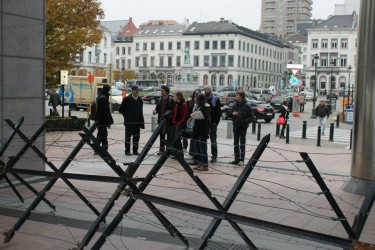This article is part of our special news coverage Europe in Crisis.
Since the economic crisis began, citizens have become increasingly attentive to corruption scandals and the relationships between politicians and private companies, in which they sometimes acquire top positions, denouncing “a global dictatorship of the markets.” In short, the strong link between political power and financial power is in the spotlight.
Recently, it has been possible to understand the attempted privatisation of the public health system in Spain [es] because of the close relationship between politicians and the private company CAPIO [es]. Another well-known fact is the hiring of previous political officers to work in large multinationals (a phenomenon known as the “revolving door”), such as the hiring of the ex Minister of Economy, Elena Salgado, by the electric utility giant, Endesa [es]. These incidents endanger popular sovereignty, democracy and citizen participation in the process of decision-making. The lack of demarcation between financial power and politics causes that private interest prevail above the public's.
Lobbying and Transparency

Image from the campaign “Clear the smoke in Brussels” (ALTER-EU)
The lack of transparency in lobbying is another element that actively affects both this link between the super powers as well as citizens. Lobbying means any individual or group that seeks to influence citizen representatives in order to get them to legislate laws in their interest. Large lobbyists operate according to private interests in a process that leaves citizens uninformed, lacking the opportunity to participate. This often goes against public interest. A few weeks ago the Dalli scandal leapt into the media spotlight [es] when the European Union Health Superintendent let a Maltese Chairman request, under his name, that a Swedish tobacco company influence the EU rules on tobacco consumption in exchange for money.
The EU has increasingly more influence in the laws and policies that affect more than 500 million Europeans; however, few know about the European Representatives and the pressure groups that influence them. For this reason, various organisations from all over Europe, amongst which are ALTER-EU, Friends of the Earth Europe and Unlock Democracy, fight for the transparency in lobbying, and are trying to implement an obligatory lobbying register accesible to the public for controlling pressure groups in different countries. This register would show who politicians are meeting with, when, for what purpose, and for how much money, as well as having information about the company that the lobbyists represent.

A group of citizens before the European Parliament enclosure. By Elena Arrontes
Various NGOs, like Access Info Europe, HAI, Environmental Service Law and Spinwatch, decided to raise awareness of the need to control lobbying through the EU Citizens Project. This allowed more than 40 European citizens, committed to transparency, to travel to Belgium in order to discover the framework of the European Institutions, to meet with European officials and to reflect about problems generated by lobbying. The central event was the conference Participation, Ethics and Transparency: What the Citizens Want from Brussels, on November 16th. Rainer Wieland (Vice-President of the European Parliament, responsible for Transparency), representatives of the Office of the Ombudsman and other European Officials formed part of the event.
Amidst the event, there were two positions running with regards to the topic of transparency: that of Isabelle Durant, Vice-President of Parliament and Head of Code of Conducts [es], who is in agreement that a Member has the obligation to declare all its spending and make public their agenda, facing the position of Wieland, who said that this would hamper the paperwork. Members of the NGO organisers reminded MEPs that they work with public money and should provide an explanation to those they represent. Wieland does not consider it to be an ethical lapse that an MEP has a second job, combining his duties with business functions. Some of the NGOs are completely against it as parliamentary work requires a full-time commitment, the salary is sufficiently high, and furthermore it combines public office with private interests which has huge risks of creating a conflict of interests.
On the second panel, more focussed on the control of lobbying, the staff of the European Commissioners unanimously asserted to be “satisfied” with the lobbying register introduced a year ago in the EU. Once again, those from the NGO EU Citizens Project complained that the registration is voluntary and therefore ineffective.
A short clip displays a summary of the conference with conclusions of the speakers:
Some of the citizens that participated in this trip published their impressions in their blogs. Alex Soler, in his blog Ominids [es], says:
Ciento cincuenta euros. Es el valor máximo legalmente aceptado para cualquier regalo que quiera hacerle, a un parlamentario europeo, una persona que se interese por su bienestar, ya sea un admirador o un lobbista representando los intereses de un determinado grupo de multinacionales. La norma no pone límite al número de veces que se le pueden hacer dichos regalos de 150€, ni tampoco al valor de los regalos que pueden recibir sus asistentes.
One hundred and fifty euros. It is the legal maximum value that can be accepted for any gift given to an MEP by a person interested in their wellbeing, whether that of an admirer or a lobbyist representing the interests of a determined group of multinationals. The law does not put a limit on the number of times that said gifts of €150 can be given, nor a value to gifts that can be received by assistants.
Jonás Candalija, writing for The Deactivating of Mines [es], finds the transparency problem is something that affects not only Spain, but the whole European Union more than he suspected:
No puedo decir que sea un experto en lobby. A duras penas consigo convencerme a mí mismo de cualquier cosa. Sin embargo, resulta un ejercicio reparador conocer hasta qué punto la opacidad informativa oscurece la actividad política en España y Europa. Cuando pensaba que el oscurantismo y la falsa rendición de cuentas eran un asunto netamente español [es], Europa se descubre como un elemento paradigmático.
I can't say that I am a lobbying expert. I hardly manage to convince myself of anything. However, it turns out to be a refreshing exercise to know to what extent the news obscures political activity in Spain and Europe. When I thought that obscurantism and the false releasing of stories was a purely Spanish matter, Europe is discovered as a paradigmatic element.
In the EU, there is considerable political resistance to the culture of transparency, a worrying fact if one considers that 50% of the national laws originate in Brussels. It is difficult to understand so much resistance and conformism in this sense, given that European institutions are living a crisis of credibility [es], a crisis that could be overcome with transparency, ethics and greater citizen participation on European issues responding to citizen demands for real and participatory democracy.
*Title page photo taken from video.
This article is part of our special news coverage Europe in Crisis.







1 comment